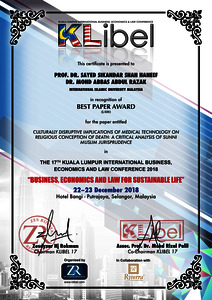Haneef, Sayed Sikandar Shah and Abdul Razak, Mohd Abbas (2018) Culturally disruptive implications of medical technology on religious conception of death: a critical analysis of Sunni Muslim jurisprudence. In: 17th Kuala Lumpur International Business, Economics and Law Conference 2018 (KLibel), 22nd-23rd December 2018, Putrajaya. (Unpublished)
|
PDF
Download (3MB) | Preview |
|
|
PDF
- Presentation
Restricted to Registered users only Download (887kB) | Request a copy |
||
![[img]](http://irep.iium.edu.my/68853/18.hassmallThumbnailVersion/68853_Culturally%20Disruptive%20Implications%20-%20best%20paper.jpg)
|
PDF (Best paper award)
- Supplemental Material
Download (1MB) | Preview |
|
|
PDF
- Submitted Version
Restricted to Registered users only Download (562kB) | Request a copy |
Abstract
Unprecedented advancement in the field of medical technology on its positive side definitely contributes to saving life and providing cure for numerous debilitating diseases and infirmities which were responsible for the demise of our forefathers during pre-technological eras. Lifeless bodies which were buried in the old times, now can be held in suspension in the ICU section of the hospitals for years, and technically considered as alive if we go by traditions criterion of death, namely stoppage of heart beat and respiratory function. On the negative side, however, it, among others, created logistic problems in terms of sustaining such patients in vegetative states through life support for the health care providers and other stakeholders. To overcome this predicament, medical technology being an evolutionary field of innovation, managed to deconstruct the traditional notion of death by replacing it with the notion of medical death, called brain death. This was inaugurated by Ad hoc Committee of the Harvard Medical School in August 1968. Nevertheless, this kind of disruption on conventional conception of death not only has enkindled ethical debate among scientific community but has challenged metaphysical view of death as upheld by major religions of world including Islam. As to how Sunni Muslim legal scholars have responded to this, is the purposes of this paper. Using textual analysis method, the paper finds that the thrust of juristic debate in the Sunni Fiqh has been as to whether brain death is a definitive indicator that the soul has left the body (metaphysical concept). The answer has been divergent but with minimum discourse on both theological and scientific dimensions of the issue. Accordingly, this paper argues that interrogating the issue from scientific dimension would have resulted in a more informed verdict on the issue.
| Item Type: | Proceeding Paper (Plenary Papers) |
|---|---|
| Additional Information: | 3049/68853 |
| Uncontrolled Keywords: | brain death, equation, legal death, Muslim Fatwa |
| Subjects: | K Law > KBP Islamic Law > KBP1 Islamic law.Shariah.Fiqh > KBP173.25 Islamic law and other disciplines or subjects K Law > KBP Islamic Law > KBP1 Islamic law.Shariah.Fiqh > KBP470 Law reform. Criticism. Tanzim |
| Kulliyyahs/Centres/Divisions/Institutes (Can select more than one option. Press CONTROL button): | Kulliyyah of Islamic Revealed Knowledge and Human Sciences Kulliyyah of Islamic Revealed Knowledge and Human Sciences > Department of Fiqh and Usul al-Fiqh Kulliyyah of Islamic Revealed Knowledge and Human Sciences > Department of Fundamental and Inter-Disciplinary Studies (Effective: 5th Feb 2014) |
| Depositing User: | Prof. Sayed Sikandar Shah Haneef |
| Date Deposited: | 08 Jan 2019 10:10 |
| Last Modified: | 08 Jan 2019 10:54 |
| URI: | http://irep.iium.edu.my/id/eprint/68853 |
Actions (login required)
 |
View Item |


 Download Statistics
Download Statistics Download Statistics
Download Statistics